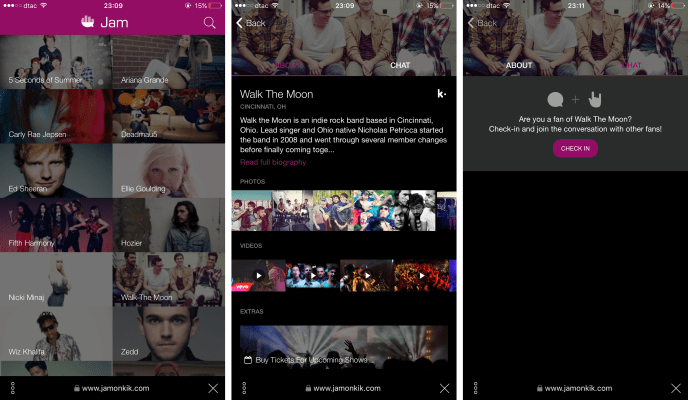Mobile messaging firm Kik is upping its focus on music after launching a new service to connect fans of top artists and bands via its popular chat app.
Named Jam, it is designed to help Kik’s 200 million registered users “meet new friends based on similar music interests.” Initially in beta and limited a few hundred thousands users, Jam — which is built on Kik’s HTML5 content platform — showcases a range of top names in music. Clicking through on each profile loads photos, bios and YouTube-powered videos, while there are options to buy gig tickets and merchandising via BandPage. The real aim isn’t to showcase content, though; it’s to create chat rooms for music lovers, and Kik users can check into an artist/band’s chat room via their profile page can find friends to chat one-on-one via the page.
The move is an interesting one for Canada-based Kik, which has quietly grown into one of the leading challengers to Snapchat in the U.S. The company has been focusing on multimedia services of late, and co-founder and CEO Ted Livingston previously hinted that Kik will take a leaf out of the Asian messaging app playbook with its own payment service and other features that complement the chat experience.
For now, it seems that Kik is focused on engaging its user base, though, which draws heavily from the teen and early-20s crowd in the U.S. and Europe. Kik introduced hashtags, which act as chat rooms in December, but we understand that the service hasn’t done as well as the company had hoped. Hashtags are mini social networks designed to help users find like-minded individuals on Kik easily. For example, clicking #soccer would take me to a platform for lovers of the beautiful game — but it seemingly required a level of user-led discovery.
With Jam, however, Kik is making that discovery easier than ever. Rather than having to find the #edsheeran hashtag, fans of the singer can almost accidentally stumble into his chat room through his songs, music and other information within Jam.
That appears to be the theory at least, although Kik explained in a blog post that Jam is initially experimental.
“The initial distribution will be limited to a few hundred thousand people so we can see what works, what doesn’t, and what to work on next. We expect the service to change over time,” it said.
Kik’s focus on chat around music is interesting because it contrasts with other messaging apps that have jumped head first into hosting content themselves. Most notably, Snapchat introduced its Discover video service earlier this year, but others are also turning to music.
This summer, Asian messaging app Line began offering a standalone, paid-for music service that syncs with its chat app, and others are likely to follow, too, as music streaming heats up.
Kik is sticking to its guns by focusing on chat. Grouping users by their music taste — and potentially other areas of interest if Jam is replicated across other verticals — could boost its promoted chat service, a money-making feature that lets brands use the service to connect with users.
